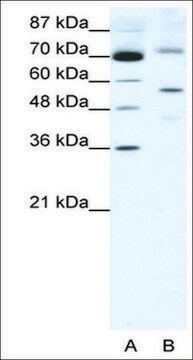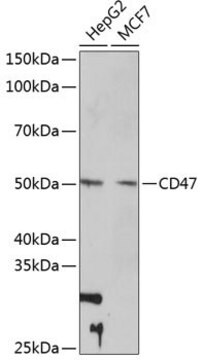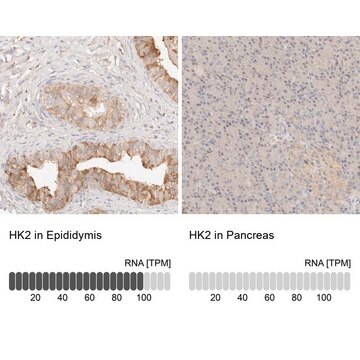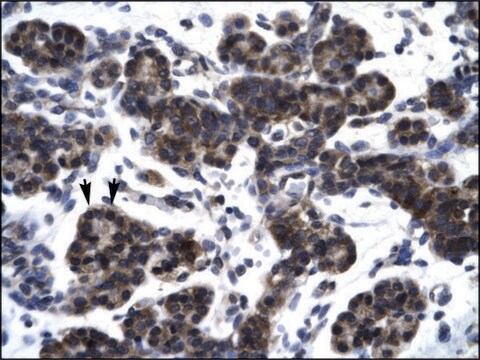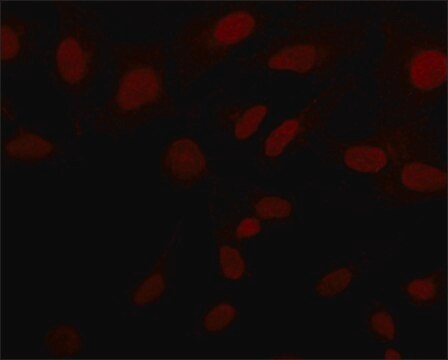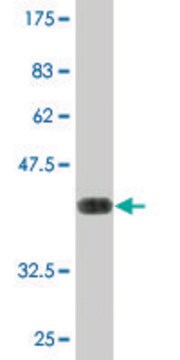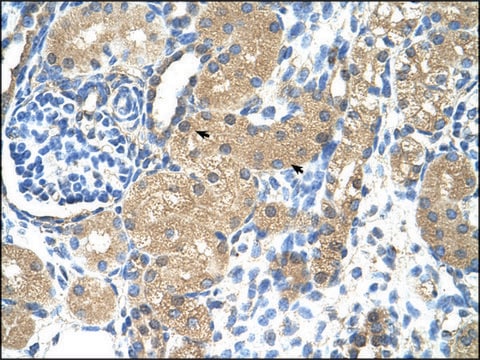推荐产品
生物源
rabbit
品質等級
共軛
unconjugated
抗體表格
affinity isolated antibody
抗體產品種類
primary antibodies
無性繁殖
polyclonal
形狀
buffered aqueous solution
分子量
26 kDa
物種活性
rat, guinea pig, dog, bovine, human, mouse, rabbit
濃度
0.5 mg - 1 mg/mL
技術
immunohistochemistry: suitable
western blot: suitable
NCBI登錄號
UniProt登錄號
運輸包裝
wet ice
儲存溫度
−20°C
目標翻譯後修改
unmodified
基因資訊
human ... MXI1(4601)
一般說明
Max interactor 1 (MXI1) is a bHLH-Zip containing protein that associates with Max to bind Myc-Max recognition sites. MXI1 mutations have been linked to prostate cancer.
Rabbit Anti-MXI1 antibody recognizes human, mouse, rat, chicken, bovine, zebrafish, and canine MXI1.
Rabbit Anti-MXI1 antibody recognizes human, mouse, rat, chicken, bovine, zebrafish, and canine MXI1.
免疫原
Synthetic peptide directed towards the middle region of human MXI1
應用
Rabbit Anti-MXI1 antibody can be used for western blot applications at 1μg/ml.
生化/生理作用
Expression of the c-myc gene, which produces an oncogenic transcription factor, is tightly regulated in normal cells but is frequently deregulated in human cancers. The MXI1 gene encodes a transcriptional repressor protein thought to negatively regulate MYC function, and is therefore a potential tumor suppressor. This protein inhibits the transcriptional activity of MYC by competing for MAX, another basic helix-loop-helix protein that binds to MYC and is required for its function. Defects in MXI1 are frequently found in patients with prostate tumors.Expression of the c-myc gene, which produces an oncogenic transcription factor, is tightly regulated in normal cells but is frequently deregulated in human cancers. The protein encoded by this gene is a transcriptional repressor thought to negatively regulate MYC function, and is therefore a potential tumor suppressor. This protein inhibits the transcriptional activity of MYC by competing for MAX, another basic helix-loop-helix protein that binds to MYC and is required for its function. Defects in this gene are frequently found in patients with prostate tumors. Three alternatively spliced transcripts encoding different isoforms have been described. Additional alternatively spliced transcripts may exist but the products of these transcripts have not been verified experimentally.
序列
Synthetic peptide located within the following region: LNKAKAHIKKLEEAERKSQHQLENLEREQRFLKWRLEQLQGPQEMERIRM
外觀
Purified antibody supplied in 1x PBS buffer with 0.09% (w/v) sodium azide and 2% sucrose.
免責聲明
Unless otherwise stated in our catalog or other company documentation accompanying the product(s), our products are intended for research use only and are not to be used for any other purpose, which includes but is not limited to, unauthorized commercial uses, in vitro diagnostic uses, ex vivo or in vivo therapeutic uses or any type of consumption or application to humans or animals.
未找到合适的产品?
试试我们的产品选型工具.
儲存類別代碼
10 - Combustible liquids
水污染物質分類(WGK)
WGK 3
閃點(°F)
Not applicable
閃點(°C)
Not applicable
L R Eagle et al.
Nature genetics, 9(3), 249-255 (1995-03-01)
The Mxi1 protein negatively regulates Myc oncoprotein activity and thus potentially serves a tumour suppressor function. MXI1 maps to chromosome 10q24-q25, a region that is deleted in some cases of prostate cancer. We have detected mutations in the retained MXI1
A S Zervos et al.
Cell, 72(2), 223-232 (1993-01-29)
We used the interaction trap to isolate a novel human protein that specifically interacts with Max. This protein, Mxi1 (for Max interactor 1), contains a bHLH-Zip motif that is similar to that found in Myc family proteins. Mxi1 interacts specifically
C L Pang et al.
Oncogene, 33(31), 4039-4049 (2013-10-22)
High-risk human papillomaviruses are causative agents of cervical cancer. Viral protein E7 is required to establish and maintain the pro-oncogenic phenotype in infected cells, but the molecular mechanisms by which E7 promotes carcinogenesis are only partially understood. Our transcriptome analyses
我们的科学家团队拥有各种研究领域经验,包括生命科学、材料科学、化学合成、色谱、分析及许多其他领域.
联系技术服务部门